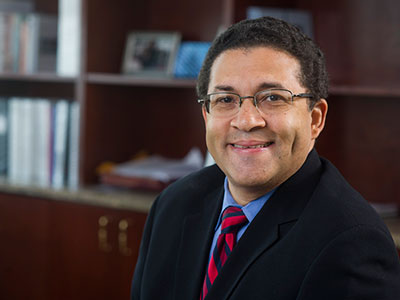 Carlton Young, M.D., has been appointed to a new position, assistant dean for Medical Student Diversity and Inclusion at the University of Alabama at Birmingham (UAB) School of Medicine, a step in UAB’s ongoing commitment to combat health disparities by educating a health care workforce to meet the needs of a diverse state and nation.
Carlton Young, M.D., has been appointed to a new position, assistant dean for Medical Student Diversity and Inclusion at the University of Alabama at Birmingham (UAB) School of Medicine, a step in UAB’s ongoing commitment to combat health disparities by educating a health care workforce to meet the needs of a diverse state and nation.
As part of the Office of Diversity and Multicultural Affairs, Young will develop partnerships with undergraduate students and programs to help those students be more competitive in applying to medical school.
Young, a professor in the Department of Surgery who joined UAB in 1997, is director of the pancreas transplant program and director of pediatric renal transplantation. His research focuses on health disparities in transplantation, primarily in African Americans, an interest he says will dovetail well with his new responsibilities.
“Everyone, in every walk of life, needs support in one form or another.” Young said. “Disadvantaged populations often need a little more, and that’s one reason the Office of Diversity and Multicultural Affairs exists in the first place. We’ve developed a strategic plan to help undergraduate students become more competitive in their applying to medical school, as well as help current medical students be more successful during their time at the UAB School of Medicine.”
“Dr. Young is going to bring a lot of energy and enthusiasm to this work,” said Hughes Evans, M.D., Ph.D., senior associate dean and chair of Medical Education. “He has a passion for working with students and increasing diversity; bringing him in will energize our students.”
Research shows medical students who come from diverse backgrounds – whether from rural areas or as racial minorities underrepresented in medicine – are more likely to serve their communities, and patients are more likely to see doctors who they view as similar to themselves, Evans said. The School of Medicine recognizes those realities by identifying, nurturing and recruiting students from varied backgrounds and makes available financial assistance, academic and personal counseling, tutorial programs and opportunities to network with other minority physicians.
Young will join Anjanetta Foster, M.D., assistant dean for Diversity and Multicultural Affairs and an assistant professor of Internal Medicine, who will increase her focus on outreach to middle school and high school students.
“We’re building role models for young people from diverse backgrounds who are interested in medicine,” Evans said. “The pairing of Dr. Young, a surgeon, and Dr. Foster, who practices in primary care and internal medicine, is a nice combination because it covers a lot of different interests, types of practices and ways to serve the community.”